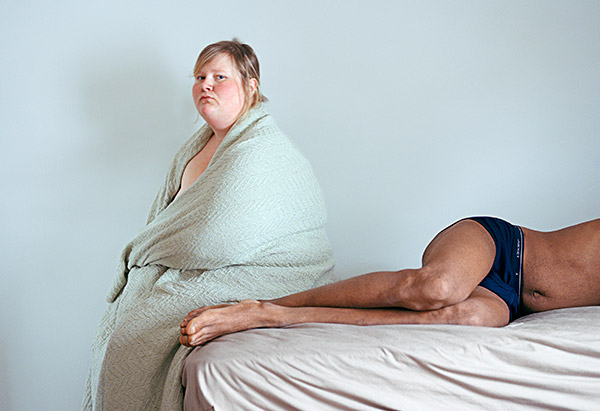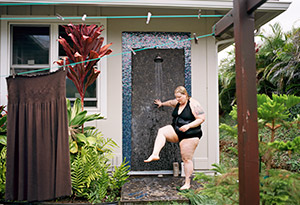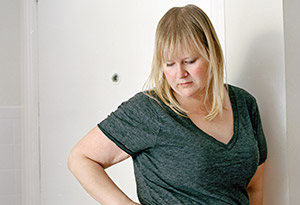A photographer loses the inspiration that fueled her work—and finally finds what she was searching for all along.

Photo: Jen Davis, Courtesy of Lee Marks Fine Art
Above: Davis shot this photo of herself in 2006. It's one in a series of self-portraits taken over the course of a decade.
If you sat down with an accomplished self-portrait photographer, the last thing you might expect to hear is "I'm a bit uneasy in my skin right now." But that's what Jen Davis tells me as she eyes the voice recorder I've set between us on her living room couch. She tucks her legs beneath her. "In fact," she says, "I have to admit I'm a little freaked out."
Davis's inhibitions are understandable. She spent ten years creating striking, seductive images of her own 269-pound frame, and now, suddenly—with the top portion of her stomach cinched by a silicone Lap-Band and the extra weight melting away—her subject is disappearing before her eyes.
As we chat about her past and her work, Davis laughs easily, and before responding to a question, she wrinkles her forehead so you can practically see her thinking. She's beautiful, with bright blue eyes and the kind of straight blonde hair the rest of us have to fake. But because she's been obese most of her life, Davis is racked with insecurities. Since she was a teenager, she has preferred to interact with the world from a distance, through the lens of a camera. During her high school years, she was constantly snapping photos of kids in the hallways and the cafeteria as a photographer for the yearbook. "I used the camera to gain access, to communicate," she says.
But the pictures she took outside school—abandoned cars on a nearby reservation; the teenage boys she pined for as they jammed with their garage bands—reflected her growing sense of isolation. Over time she began to focus on capturing the loneliness in others. "It was like I was taking self-portraits," she says, "except I wasn't in them."
When Davis was 23, her work took a turn: Reading through her old journals, she was struck by the fact that her grievances—being overweight, missing out on romantic love—had been the same for years. Maybe, she thought, if I turn the camera on myself, I might shake loose whatever is holding me back. In the first self-portrait she ever snapped, Davis sits on a bamboo mat on the sand, on spring break in Myrtle Beach, her one-piece bathing suit concealed by a green cover-up and black shorts; the friends around her are slender in their bikinis and swim trunks, and the uneasiness on her face is palpable.
Next: Davis's decadelong project
If you sat down with an accomplished self-portrait photographer, the last thing you might expect to hear is "I'm a bit uneasy in my skin right now." But that's what Jen Davis tells me as she eyes the voice recorder I've set between us on her living room couch. She tucks her legs beneath her. "In fact," she says, "I have to admit I'm a little freaked out."
Davis's inhibitions are understandable. She spent ten years creating striking, seductive images of her own 269-pound frame, and now, suddenly—with the top portion of her stomach cinched by a silicone Lap-Band and the extra weight melting away—her subject is disappearing before her eyes.
As we chat about her past and her work, Davis laughs easily, and before responding to a question, she wrinkles her forehead so you can practically see her thinking. She's beautiful, with bright blue eyes and the kind of straight blonde hair the rest of us have to fake. But because she's been obese most of her life, Davis is racked with insecurities. Since she was a teenager, she has preferred to interact with the world from a distance, through the lens of a camera. During her high school years, she was constantly snapping photos of kids in the hallways and the cafeteria as a photographer for the yearbook. "I used the camera to gain access, to communicate," she says.
But the pictures she took outside school—abandoned cars on a nearby reservation; the teenage boys she pined for as they jammed with their garage bands—reflected her growing sense of isolation. Over time she began to focus on capturing the loneliness in others. "It was like I was taking self-portraits," she says, "except I wasn't in them."
When Davis was 23, her work took a turn: Reading through her old journals, she was struck by the fact that her grievances—being overweight, missing out on romantic love—had been the same for years. Maybe, she thought, if I turn the camera on myself, I might shake loose whatever is holding me back. In the first self-portrait she ever snapped, Davis sits on a bamboo mat on the sand, on spring break in Myrtle Beach, her one-piece bathing suit concealed by a green cover-up and black shorts; the friends around her are slender in their bikinis and swim trunks, and the uneasiness on her face is palpable.
Next: Davis's decadelong project

Photo: Jen Davis, Courtesy of Lee Marks Fine Art
So began a decadelong project, during which Davis shot hundreds of images of her body. "A lot of artists use self-portraits to transform into other identities. But my intention was to understand myself better. To articulate myself through the lens."
The photos are arresting. In one, Davis is fresh out of the shower, wrapped in a maroon towel, water droplets dotting her pale shoulders. In another, she is floating on her back in a concrete water tank, her limbs spread like starfish rays. Some shots convey her anxieties more directly: her fingers trying to button a too-small pair of pants; her eyes doleful as she lies awake in the toned arms of a sleeping man. Davis never imagined an audience when she began the project. Had she envisioned her photos hanging in museums and galleries, she wouldn't have been as bold, she says.
But it wasn't long before the powerfully raw images generated buzz in the photography world. Davis was accepted to the Yale University School of Art's Master of Fine Arts program. Galleries in France, Spain, and Italy exhibited her work. The New York Times Magazine published her photos. She won awards and grants, and colleges and museums invited her to lecture on her portrayals of beauty and sexuality.
And then, in the spring of 2011, during a photography residency in Syracuse, New York, while Davis was reviewing her portfolio—dozens of portraits blown up and hung on the wall—she was struck with the same feeling of horror she'd felt reading through her journals when she was 23. "In ten years, my body hadn't really changed, and I hadn't changed, either," she says. "The problem was that I was making myself vulnerable only for the camera. What I really wanted was to be vulnerable for another person."
That summer Davis underwent Lap-Band surgery, and after ten months, as this issue goes to press, she has lost 95 pounds—bringing her weight down to 174.
Despite the very real physical limitations created by a Lap-Band, patients who undergo the procedure must commit to eating healthily for long-term success. The failure rate, says Michael Hill, MD, of Adirondack Surgical Group, who has performed hundreds of these operations, is between 40 and 50 percent. Davis has not only adjusted to a new lifestyle but dedicated herself utterly to it. She has revamped her diet—eating mindfully (without distractions like the computer), avoiding simple carbohydrates, enjoying the feeling of filling up on nutritious foods like fruits and vegetables. She also hits the gym twice a week for cardio and weights, and does Pilates twice a week at home.
Top: Davis in 2011
Next: How Davis adapted to the changes
The photos are arresting. In one, Davis is fresh out of the shower, wrapped in a maroon towel, water droplets dotting her pale shoulders. In another, she is floating on her back in a concrete water tank, her limbs spread like starfish rays. Some shots convey her anxieties more directly: her fingers trying to button a too-small pair of pants; her eyes doleful as she lies awake in the toned arms of a sleeping man. Davis never imagined an audience when she began the project. Had she envisioned her photos hanging in museums and galleries, she wouldn't have been as bold, she says.
But it wasn't long before the powerfully raw images generated buzz in the photography world. Davis was accepted to the Yale University School of Art's Master of Fine Arts program. Galleries in France, Spain, and Italy exhibited her work. The New York Times Magazine published her photos. She won awards and grants, and colleges and museums invited her to lecture on her portrayals of beauty and sexuality.
And then, in the spring of 2011, during a photography residency in Syracuse, New York, while Davis was reviewing her portfolio—dozens of portraits blown up and hung on the wall—she was struck with the same feeling of horror she'd felt reading through her journals when she was 23. "In ten years, my body hadn't really changed, and I hadn't changed, either," she says. "The problem was that I was making myself vulnerable only for the camera. What I really wanted was to be vulnerable for another person."
That summer Davis underwent Lap-Band surgery, and after ten months, as this issue goes to press, she has lost 95 pounds—bringing her weight down to 174.
Despite the very real physical limitations created by a Lap-Band, patients who undergo the procedure must commit to eating healthily for long-term success. The failure rate, says Michael Hill, MD, of Adirondack Surgical Group, who has performed hundreds of these operations, is between 40 and 50 percent. Davis has not only adjusted to a new lifestyle but dedicated herself utterly to it. She has revamped her diet—eating mindfully (without distractions like the computer), avoiding simple carbohydrates, enjoying the feeling of filling up on nutritious foods like fruits and vegetables. She also hits the gym twice a week for cardio and weights, and does Pilates twice a week at home.
Top: Davis in 2011
Next: How Davis adapted to the changes

Photo: Jen Davis, Courtesy of Lee Marks Fine Art
Davis had always assumed she'd die young when she was obese and a heavy smoker, and on some level, she was okay with that. Now she shudders to recall that feeling of indifference. There's so much to live for—including the thrill of going on first dates. "I'm 34, and I've never had a boyfriend," she says with a wistful smile. "I have a lot to learn."
But with all the changes, Davis has struggled artistically over the past year. She found herself craving a break from photographing her body as it began to slim down; she felt more beautiful and more desirable than ever before—but also more exposed, without all the extra weight to shield her from the world. It wasn't until this spring that she finally aimed the camera at herself again. "I thought the self-portraits might help me process my new life," Davis says. "I was ready to go back under my microscope."
She is surprised and excited by what she's discovering in her recent images: "My sexuality feels tangible for the first time. There's a change in tone. Where I once saw an overpowering sadness, I now see confidence." It's in her gestures, and the way she holds herself.
In Davis's favorite portrait so far, she is looking at her reflection in the mirror. "You can tell from my expression that I'm not being critical," she says. "You can almost see the realization on my face: I am open to myself."
Top: Davis in 2012
Diana Spechler is the author of Skinny: A Novel (Harper Perennial).
More on Weight Loss
But with all the changes, Davis has struggled artistically over the past year. She found herself craving a break from photographing her body as it began to slim down; she felt more beautiful and more desirable than ever before—but also more exposed, without all the extra weight to shield her from the world. It wasn't until this spring that she finally aimed the camera at herself again. "I thought the self-portraits might help me process my new life," Davis says. "I was ready to go back under my microscope."
She is surprised and excited by what she's discovering in her recent images: "My sexuality feels tangible for the first time. There's a change in tone. Where I once saw an overpowering sadness, I now see confidence." It's in her gestures, and the way she holds herself.
In Davis's favorite portrait so far, she is looking at her reflection in the mirror. "You can tell from my expression that I'm not being critical," she says. "You can almost see the realization on my face: I am open to myself."
Top: Davis in 2012
Diana Spechler is the author of Skinny: A Novel (Harper Perennial).
More on Weight Loss




